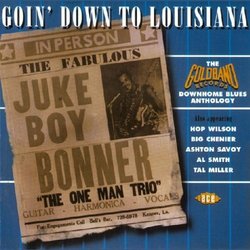| All Artists: Goin' Down to Louisiana Title: Goin' Down to Louisiana Members Wishing: 1 Total Copies: 0 Label: Ace Records UK Release Date: 12/27/2004 Album Type: Import Genres: Blues, Pop Style: Number of Discs: 1 SwapaCD Credits: 1 UPC: 029667182126 |
Search - Goin' Down to Louisiana :: Goin' Down to Louisiana
 | Goin' Down to Louisiana Goin' Down to Louisiana Genres: Blues, Pop
The Goldband label of Lake Charles, Louisiana, is probably best known for its catalog of Cajun music. But, as Goin' Down to Louisiana proves, it also paid attention to the local down-home blues scene in the 1950s and '60s.... more » |
Larger Image |
CD Details
Synopsis
Amazon.co.uk
The Goldband label of Lake Charles, Louisiana, is probably best known for its catalog of Cajun music. But, as Goin' Down to Louisiana proves, it also paid attention to the local down-home blues scene in the 1950s and '60s. Performers like Ashton Savoy and Big Chenier may never have made it out of that local scene, but they produced some distinctive recordings, like Savoy's "Need Shorter Hours," a drawling, Jimmy Reed-like complaint about the rigors of the working week, and Chenier's rough-hewn "The Dog and His Puppies." Also featured on Goldband's bright yellow label were the Houston lap-steel guitarist Hop Wilson, the gruff singer and harmonica player Al Smith, and the Charles Brown-ish Tal Miller. But the juiciest shrimps in this gumbo are the 10 tracks by singer, guitarist, harmonica-player, and powerful blues writer Juke Boy Bonner, which were issued on a 1960s LP and have long been unavailable. Bonner's vision of the world was seldom upbeat, and in songs like "Blue River Rising," "My Time to Go," and "Life Is a Dirty Deal," he translates his dissatisfaction into words and tunes that etch their grim message unforgettably on the listener's consciousness. --Tony Russell
Similar CDs
| Urie, Steiner Rice Friendship Genre: Gospel | |

 Track Listings (30) - Disc #1
Track Listings (30) - Disc #1